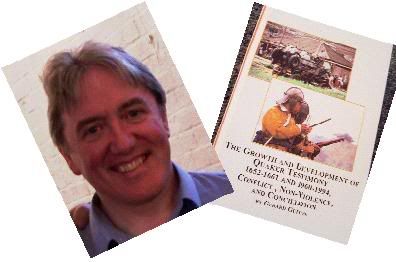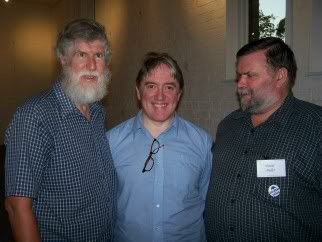Last night, I attended the launch of Gerard Guiton's book, The Growth and Development of Quaker Testimony 1652-1661 and 1960-1994, Conflict, Non-Violence and Conciliation. OK, I know. He knows. Yes, it's not catchiest title ever dreamed up for a book jacket - but he does have a good excuse. It is the book of the PhD.
Gerry's "first vocation" was teaching - in Australia and the UK. He has gone on since to spend his life immersed in peace and social justice: as Peace/Global Education Officer with World Vision Australia and as National Publications Officer for Oxfam Australia. Gerry is a Quaker with all the activity and concern that goes with the territory. He has been Friend-in-Residence at Woodbrooke, the Quaker Study Centre in Birmingham in the UK and has been the Henry J Cadbury Scholar at Pendle Hill, the Quaker Study Centre in Philadelphia in the USA.
Gerry's book examines the historical and spiritual underpinnings of contemporary Quaker approaches to conflict in third world military settings. Early Quaker Testimony was predicated on conflict on three levels namely inner (in which sin was purged); within the Society of Friends; and from hostile external forces. The Testimony also possessed a tripartite form instanced in the settling of conflicts within and beyond the Society; witnessing for justice and peace; and establishing mutual support systems.
Dale Hess (left) and Dave Bullen (right) who launched Gerry's book.
Contemporary Quaker Testimony, also arising from conflict and in tripartite form, is compared to Early Quaker Testimony to delineate convergences and divergences in theology, language use, approaches to authority, public witness and mutual support systems. Gerry specifically investigates South African Quakerism under Apartheid - between the Sharpeville massacre in 1960 and the all-party elections of 1994. This odyssey makes possible an analysis and discussion of individual and corporate experiences of conflict. Particularly noteworthy is Hendrik W van der Merwe, an international mediator who helped to facilitate the talks leading to the release of Nelson Mandela whom he knew. Quaker mediation is described along with conflict and dispute resolution techniques within the context of mediation-conflict theory.Gerry expects that this book will benefit individuals and organisations involved in mediation, facilitation and third party interventions. It will also be of interest in the area of community, industrial, school, church and family dispute resolution.
Gerry's book can be accessed either for reference or purchase on
(a) http://www.mellenpress.com/mellenpress.cfm?&pc=8&catkey=48 and


